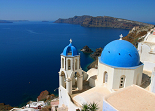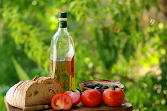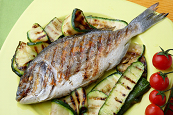 If you want to enjoy a longer life, eat a Mediterranean diet: lots of vegetables, legumes, fruits, and cereals, along with plenty of fish. Keep your intake of saturated fats low but your consumption of olive oil high. Avoid dairy products and meat.
If you want to enjoy a longer life, eat a Mediterranean diet: lots of vegetables, legumes, fruits, and cereals, along with plenty of fish. Keep your intake of saturated fats low but your consumption of olive oil high. Avoid dairy products and meat.
The American Institute for Cancer Research (AICR) guidelines emphasize a plant-based diet centered around vegetables, fruits, whole grains and beans that is similar to the traditional Mediterranean and Okinawan diets.
Five to 10 servings of fruits and vegetables a day are recommended to provide the antioxidant vitamins and protective phytochemicals that can prevent or repair cell damage before it turns into cancer.
Researchers from Harvard and University of Athens Medical School have shown that people who closely follow a traditional Mediterranean diet live longer than those who don’t and experience a dramatic reduction in death due to heart disease and cancer.
The traditional Mediterranean diet puts the emphasis on vegetables, legumes, fruits, nuts, cereals, olive oil, fish and moderate amounts of wine.
Researchers found that those who followed the typical Mediterranean diet the closest lived the longest and had the lowest incidence of heart disease and cancer.
Working with a 10-point scale that gauged adherence to the diet, researchers found that for every two points on the scale led to a 25% reduction in overall death rates.
It also led to a 33% reduction in deaths from coronary heart disease, and a 24% reduction in deaths from cancer.
“Twenty-five percent is a very substantial reduction,” says Dr. Dimitrios Trichopoulos, the senior author of the study and a professor in the department of epidemiology at the Harvard School of Public Health.
“It tells you that diet can accomplish that [decreased mortality] over and beyond obesity and everything else. This is an important message because there has been doubt about what you can accomplish with diet,” he adds.
The traditional Mediterranean diet puts the emphasis on vegetables,  legumes, fruits, nuts, cereals and olive oil.
legumes, fruits, nuts, cereals and olive oil.
It goes light on saturated fats and involves a moderately high intake of fish, a low-to-moderate intake of dairy products, a low intake of meat and poultry and a regular, albeit moderate, intake of alcohol, mostly in the form of wine at meals.
The Harvard study analyzed the dietary patterns of 22,043 adults in Greece for almost four years who ranged in age from 20 to 86.
The Athens study involved over 74,000 healthy men and women, aged 60 or more, living in nine European countries.
Each participant was given a detailed questionnaire about 150 foods and beverages commonly consumed in the Mediterranean countries.
They were asked to record how frequently they consumed the items and what the portion size was. The researchers also collected information on physical activity, lifestyle and other relevant factors.
Those who adhered more closely to the Mediterranean diet were less likely to die, in general, and were less likely to die of coronary heart disease or cancer.
Okinawan Diet
 Okinawa is sometimes called “the Hawaii of Japan.” It is home to people with the longest documented life expectancy of any country in the world.
Okinawa is sometimes called “the Hawaii of Japan.” It is home to people with the longest documented life expectancy of any country in the world.
On the whole, people in Japan live more years in good health than Americans, with substantially lower rates for most cancers.
Okinawans are the longest-lived and the least likely to get heart disease or several cancers (including breast and prostate) of any group in the world. And they don’t have the high rates of stroke and stomach cancer as those seen in mainland Japan.
However, when Okinawans move to other countries, including the United States, they tend develop the shorter life expectancy and higher rates of cancer and heart disease common in their adopted country.
Okinawans average nine fruit and vegetable servings daily (compared to the U.S. average of less than four), with an emphasis on antioxidant-rich choices rather than Americans’ predominant reliance on potatoes and iceberg lettuce.
The Okinawan diet is a low-fat diet, containing only 26% of daily calories from fat. The standard American diet consist of 40% fat.
Meat consumption in Okinawa is about half that of the United States, with greater reliance on fish, soy foods and other vegetarian proteins.
Some studies suggest that the type of fat in some fish and certain phytochemicals in soy may help protect against some cancers.
Another prime difference between American and Okinawan eating habits is calorie consumption. In contrast to the super-sized, “all-you-can-eat” style so common in the U.S., the traditional Okinawan food culture follows a principle called hara hachi bu, which means you stop eating when you feel 80 percent full.
Okinawan tradition results in portions that are about half those in the U.S., and 10 to 40% lower in overall calorie consumption.
Older Okinawans who have not adopted more Westernized habits are lean, with measures of body fat at the bottom end of the range recommended in this country.

